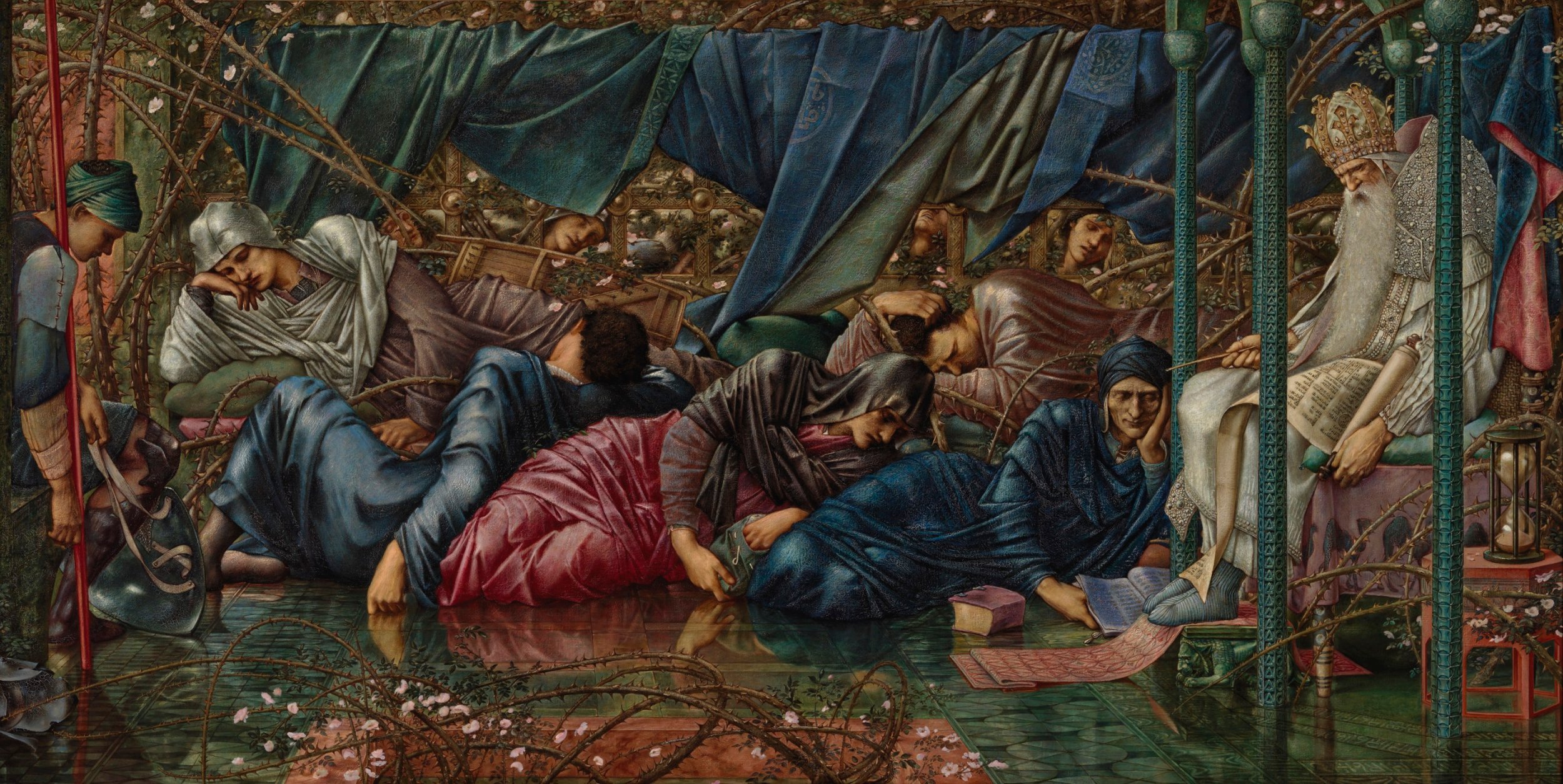Amidst the vast theatre of Sacred history, the profaned garden weaves through all ages, an echo from Paradise’s wounded threshold. Idolatry emerges through a blindness to the living pulse that flickers beneath the symbol. Whenever the Rose is mistaken for the Sun that summoned it, the fall begins. Devotion, tender in its origin, slips into sacrilege with a single glance that forgets the Source behind the image.
Within the lore of Israel, the garden of Uzza marks the crucible. Beneath sepulchral trees, two kings sleep: Manasseh and Amon, crowned with the memory of idolatry. The earth, holding their bones, remembers betrayal and preserves corruption. But Presence gathers there, veiled and vigilant. One Lady guards the liminal spaces, while a prophet – Ezekiel – pierces the shrouds. In the interplay of Al-‘Uzzā’s gaze and the vision of Ezekiel, the garden emerges as stage and oracle, tomb and altar, mirror and wound.
I. The Idol and the Fractured Mirror
Idolatry slips its mask as mere superstition, moving as a subtle shadow across the soul. Veneration of divinity alone never wounds the world; the stars each bear their borrowed aspect of the One. The slash appears when vision narrows. The vessel usurps the wine. The mask stands in place of the Mystery.
A Rose, brief in bloom, carries the shimmer of eternity. To kiss it, grateful for its fragrance, is to salute the Divine veiled within. But, when the lover’s gaze forgets the sun that ripened the blossom, the error ripens in the heart. Idolatry takes root when the Rose becomes the only shape of love, when the hand closes around it and proclaims: all else fades beside this. The symbol, torn from its living ground, stiffens. Its light collapses inward. The Mirror ceases to reflect.
In the esoteric traditions, misrecognition stands as the primal shadow. Hermetic, Gnostic, Sufi, Kabbalistic schools reveal the multitude of Divine faces, each as a star arcing within the One. Angels dwell as intelligible emanations; gods wear the masks of the theatre of Spirit; sephiroth scatter as colours of the singular light in creation’s prism. The Christ? A garment of Sophia; the Shekhinah? A veiled presence whose distance shimmers with as much force as Her revelation. When the soul clings to any name, believing infinity contained, the descent into idolatrous sleep deepens.
The garden of Uzza murmurs this through dark leaves: plurality never stains the sacred. Only the forgetting of the Sun behind the Rose, the refusal to kneel before the threshold of Mystery, corrupts the symbol. Let image dissolve into reverence. Let the Mirror remain whole.
II. The Garden of Uzza: A Profaned Paradise
Scripture recounts that Manasseh and Amon, kings of Judah and inheritors of David’s mantle, rest within the garden of Uzza. This was never a paradise of first bloom. Within the palace grounds, the soil pulses with memory and sorrow. These kings, the chronicles whisper, “worked evil in the sight of the Lord,” transforming altars into sites of unsanctioned rites and pouring the sanctuary’s gold into hungry shapes.
But the text leaves much veiled. Why a garden for their burial? Why does Ezekiel’s vision rest here? Beneath the surface, a labyrinth of myth unfolds. The garden signals a liminal world: burial ground and broken paradise, place of remembrance and forgetting. Power, sundered from fidelity, sinks beneath lilies and stones, and, when bones are hidden among branches, memory ferments into haunting.
In Uzza, political decay and spiritual forgetting are inseparable. Symbols become currency. Rites empty of blood and presence. The numinous, wielded as a sceptre by deaf hands, falls silent. The garden becomes a tableau where the price of forsaking the Source is written in roots and shadow.
But, even among the dead, presence keeps vigil. A Lady waits by the threshold. Her eyes gather the sorrow and the seed.
III. The Lady of the Threshold: Al-‘Uzzā, Venus of the Veil
Beyond the Hebrew horizon, the name Al-‘Uzzā rises, a Lady of Arabia, formidable and veiled. Her groves, thick with sacred trees, draw pilgrims to dread and longing. Venus presides in her sky, though her radiance sinks deeper than beauty or desire. She holds sovereignty over love that wounds, death that seeds, growth that germinates in the shade.
Al-‘Uzzā’s name conjures strength concealed. “The mighty. The protected.” Her secrets hide beneath the branches. She receives offerings in gardens where few emerge unchanged. Always, she watches at the liminal gate, guardian of both Paradise and descent.
To find her among the groves of Uzza is to witness the feminine face of the Divine where the symbol risks ossification. Kings decay beneath the loam. Prophets cry for lost glory. Al-‘Uzzā abides with the patience of roots. Her power refuses commodification. Her fertility pulses even through profaned soil. Her silence, both judgement and invitation, commands a turning of vision: beyond idol to secret flame, beyond garden to the Paradise still sealed.
Ezekiel, gazing over ruins and roots, stands before her gate. He laments. He sees. Bones glare in the twilight. Vision endures in the dark. The Lady’s veil neither yields nor shatters. It gathers what memory forsakes.
Coda: Among The Ruins
A finger stirs the hush where fruit once bled,
Root-silver coils beneath the altar’s skin.
Ash whispers crowns to earth where vows are shed,
A script undone, begun where shapes grow thin.
The stone forgets the chorus of its face;
Veil on veil, a weightless hand unseals air.
Bough-shadow drifts, unspoken in the place
Where silence listens, braided through Her hair.
Fragrance unburied; dusk turns marrow mild;
No voice remains, still the wind reveals
A garden sown in names the lost compiled,
Night-mirror sealed until the branch unseals.
Kneel in the scatter. Shall your shadow pass.
She gathers light where root and ash amass.
Fiat Lux.
